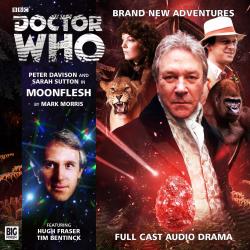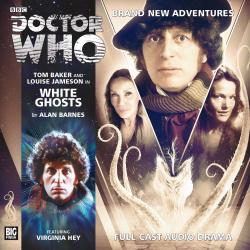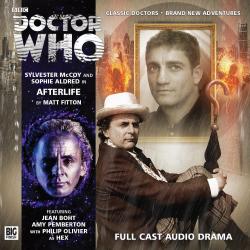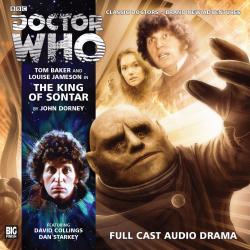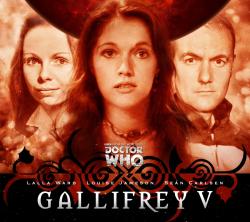Moonflesh (Big Finish)
Thursday, 15 May 2014 - Reviewed by
Taking place between seasons 19 and 20 of the classic television series, when the fifth Doctor (Peter Davison) and Nyssa of Traken (Sarah Sutton) were temporarily travelling together without Tegan and other companions, Moonflesh is an earth-bound adventure, set in Suffolk – a fact the Doctor deduces by the fragrance of the local leaf mould – in late October 1911.
The story begins with the TARDIS materialising close to the home of a famous explorer, Nathaniel Whitlock (Tim Bentinck) and his loving daughter Phoebe (Rosanna Miles). Whitlock has stocked the grounds of his estate with lions, elephants and other exotic wildlife, and charges visitors handsomely for the experience of hunting them. He is attended by a faithful Native American servant, Silver Crow (John Banks), whose hunting skills and spiritual beliefs soon prove significant – especially once the Doctor and Nyssa find themselves being stalked by a hungry lioness within minutes of landing!
With their arrival coinciding with that of a wealthy hunting party – bullying industrialist Edwin Tremayne (Hugh Fraser), his put-upon son Hector (Geoffrey Breton), and Ms Hannah Bartholemew (Francesca Hunt), an ardent supporter of women’s equality who has quite the eye for a pretty girl herself – it’s not long before mysteries unfold and secrets are revealed, with potentially fatal consequences for all concerned.
Writer Mark Morris has previously depicted the fifth Doctor in the BBC Past Doctor Adventure Deep Blue, as well as in the Big Finish audio Plague of the Daleks, and has a firm grasp of the character of the Time Lord. Scenes such as one where the Doctor gets to display his bedside manner, or casually refers to being “possessed by aliens dozens of times and it’s never done me any harm,” are delightful. Nyssa is also well written, portrayed as compassionate, intelligent and inquisitive; their scenes together are particularly enjoyable.
Morris’s supporting characters are slightly less well-realised, tending more towards the larger than life than the well-rounded; however the relationships between them are well presented thanks to a combination of effective dialogue and strong performances – though having two blustering and headstrong Englishmen in the one story does sometimes make the characters of Edwin Tremayne and Nathaniel Whitlock a little hard to differentiate, for which director Ken Bentley must also bear some blame.
Elements of mysticism and mythology in the story evoke the feel of televised fifth Doctor adventures such as Kinda, while the historical setting naturally recalls Black Orchid; as the story develops, it also calls to mind the standard base-under-siege adventures of the second Doctor, as well as two fourth Doctor stories in particular: Horror of Fang Rock and The Hand of Fear.
The plot is serviceable though not outstanding, and some aspects of the story don’t hold up to scrutiny – if only Whitlock and his daughter live in their vast house, for instance, who feeds the wildlife and prevents their animals from escaping into the surrounding countryside?
The writer’s decision to set an extended sequence of his story in the spirit world of America’s First Peoples is more problematic; but while Morris’ appropriation of Native American religious beliefs borders on insensitivity, the fact that Moonflesh resorts to an audio equivalent of blackface by having a white English actor, John Banks, playing a Native American role, is of greater concern. That Banks plays the role – which borders on the cliché of the noble savage – well is beside the point; unless Big Finish is 100% committed to colour-blind casting across its ranges for all characters, it’s a casting decision which at best suggests a lack of respect for indigenous peoples, especially when one considers the low number of peoples of colour employed in the British entertainment industry.
More positively, Andy Hardwick’s sound design is nuanced and subtle, with every creaking floorboard and crackling flame adding to the atmosphere evoked by his richly cinematic score; and while the story may be a trifle shallow, overall Moonflesh is well-paced and – save for the flaws mentioned above – a mostly satisfying addition to the monthly range.
The story begins with the TARDIS materialising close to the home of a famous explorer, Nathaniel Whitlock (Tim Bentinck) and his loving daughter Phoebe (Rosanna Miles). Whitlock has stocked the grounds of his estate with lions, elephants and other exotic wildlife, and charges visitors handsomely for the experience of hunting them. He is attended by a faithful Native American servant, Silver Crow (John Banks), whose hunting skills and spiritual beliefs soon prove significant – especially once the Doctor and Nyssa find themselves being stalked by a hungry lioness within minutes of landing!
With their arrival coinciding with that of a wealthy hunting party – bullying industrialist Edwin Tremayne (Hugh Fraser), his put-upon son Hector (Geoffrey Breton), and Ms Hannah Bartholemew (Francesca Hunt), an ardent supporter of women’s equality who has quite the eye for a pretty girl herself – it’s not long before mysteries unfold and secrets are revealed, with potentially fatal consequences for all concerned.
Writer Mark Morris has previously depicted the fifth Doctor in the BBC Past Doctor Adventure Deep Blue, as well as in the Big Finish audio Plague of the Daleks, and has a firm grasp of the character of the Time Lord. Scenes such as one where the Doctor gets to display his bedside manner, or casually refers to being “possessed by aliens dozens of times and it’s never done me any harm,” are delightful. Nyssa is also well written, portrayed as compassionate, intelligent and inquisitive; their scenes together are particularly enjoyable.
Morris’s supporting characters are slightly less well-realised, tending more towards the larger than life than the well-rounded; however the relationships between them are well presented thanks to a combination of effective dialogue and strong performances – though having two blustering and headstrong Englishmen in the one story does sometimes make the characters of Edwin Tremayne and Nathaniel Whitlock a little hard to differentiate, for which director Ken Bentley must also bear some blame.
Elements of mysticism and mythology in the story evoke the feel of televised fifth Doctor adventures such as Kinda, while the historical setting naturally recalls Black Orchid; as the story develops, it also calls to mind the standard base-under-siege adventures of the second Doctor, as well as two fourth Doctor stories in particular: Horror of Fang Rock and The Hand of Fear.
The plot is serviceable though not outstanding, and some aspects of the story don’t hold up to scrutiny – if only Whitlock and his daughter live in their vast house, for instance, who feeds the wildlife and prevents their animals from escaping into the surrounding countryside?
The writer’s decision to set an extended sequence of his story in the spirit world of America’s First Peoples is more problematic; but while Morris’ appropriation of Native American religious beliefs borders on insensitivity, the fact that Moonflesh resorts to an audio equivalent of blackface by having a white English actor, John Banks, playing a Native American role, is of greater concern. That Banks plays the role – which borders on the cliché of the noble savage – well is beside the point; unless Big Finish is 100% committed to colour-blind casting across its ranges for all characters, it’s a casting decision which at best suggests a lack of respect for indigenous peoples, especially when one considers the low number of peoples of colour employed in the British entertainment industry.
More positively, Andy Hardwick’s sound design is nuanced and subtle, with every creaking floorboard and crackling flame adding to the atmosphere evoked by his richly cinematic score; and while the story may be a trifle shallow, overall Moonflesh is well-paced and – save for the flaws mentioned above – a mostly satisfying addition to the monthly range.
